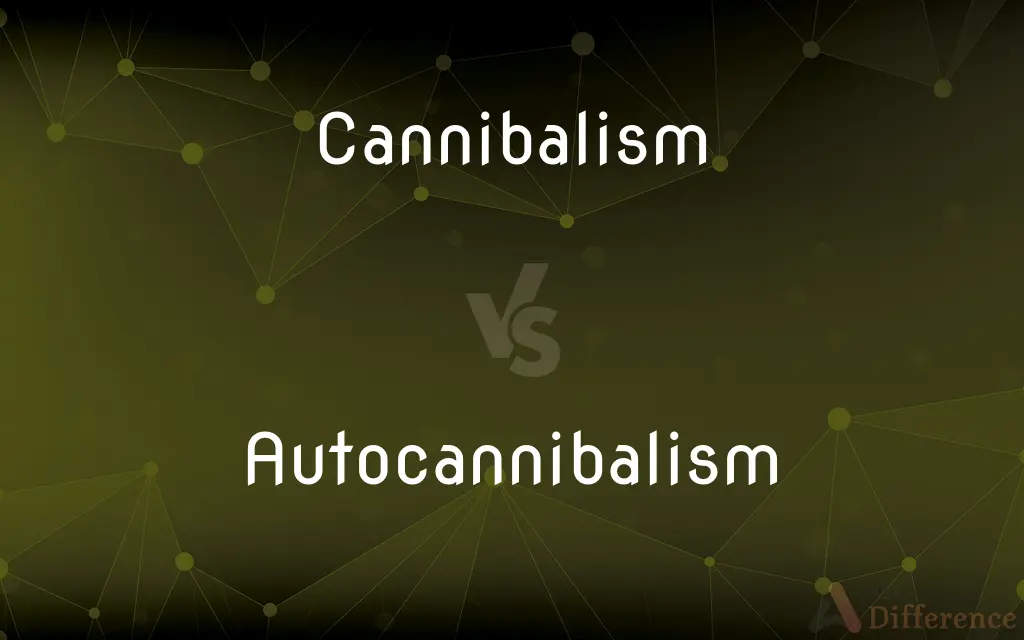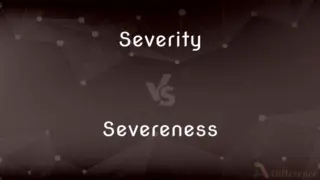Cannibalism vs. Autocannibalism — What's the Difference?
By Urooj Arif & Fiza Rafique — Updated on April 26, 2024
Cannibalism involves consuming individuals of the same species, whereas autocannibalism is the act of eating parts of one’s own body.

Difference Between Cannibalism and Autocannibalism
Table of Contents
ADVERTISEMENT
Key Differences
Cannibalism refers to the practice of organisms eating other organisms of their own species, often observed in both animal behavior and human history for various reasons. Whereas, autocannibalism involves an individual consuming parts of their own body, which can range from unintentional actions like biting nails to more extreme cases.
In the animal kingdom, cannibalism can be a survival tactic during food shortages or a strategy to eliminate competition. On the other hand, autocannibalism in animals is rare and usually occurs due to stress or confinement leading to self-mutilation.
Among humans, cannibalism has been practiced in ritualistic contexts or as a necessity in extreme survival situations. While, autocannibalism in humans is generally considered a psychological disorder when it involves significant self-harm.
Ethically and culturally, cannibalism is widely condemned and taboo in most societies due to its implications about human dignity and life. Whereas, autocannibalism might not evoke the same level of social outrage unless it involves severe self-injury.
Legal perspectives on cannibalism typically categorize it as a criminal offense, especially when linked to murder or desecration of corpses. In contrast, autocannibalism, unless it poses a public health risk, tends to fall into a legal grey area, more often addressed through medical and psychological care.
ADVERTISEMENT
Comparison Chart
Definition
Eating individuals of the same species.
Eating parts of one’s own body.
Contexts
Rituals, survival, cultural practices.
Psychological disorders, stress behaviors.
Ethical View
Generally taboo and condemned.
Viewed as a mental health issue.
Legal Status
Illegal, associated with other crimes.
Legal grey area, rarely criminalized.
Common in
Both humans and animals.
Rare in animals, pathological in humans.
Compare with Definitions
Cannibalism
Eating of the same species.
Cannibalism is documented among many predator species.
Autocannibalism
Linked to mental disorders.
Severe autocannibalism can be a sign of serious psychological issues.
Cannibalism
Associated with rituals.
Some ancient rituals involved cannibalism as a spiritual act.
Autocannibalism
Not typically criminal.
There are no specific laws against autocannibalism, focusing instead on mental health treatment.
Cannibalism
A cultural or survival act.
Historical accounts of cannibalism often emerge from extreme survival scenarios.
Autocannibalism
Rarely discussed openly.
Autocannibalism is not often discussed due to its disturbing nature.
Cannibalism
Taboo and often illegal.
Cannibalism is illegal in most societies due to ethical considerations.
Autocannibalism
Self-consumption.
Autocannibalism includes acts like biting one’s nails or eating skin.
Cannibalism
Observed in distressed environments.
Overcrowding in animal populations sometimes leads to cannibalism.
Autocannibalism
Less understood.
The motivations behind autocannibalism are less understood and often relate to compulsion.
Cannibalism
Cannibalism is the act of consuming another individual of the same species as food. Cannibalism is a common ecological interaction in the animal kingdom and has been recorded in more than 1,500 species.
Autocannibalism
The eating of part of one's own body.
God damn it babies, you've got to involuntarily practice some degree of autocannibalism - alt text for Dinosaur Comics, February 15, 2012, [http://www.qwantz.com/index.php?comic=2144]
Cannibalism
A person who eats the flesh of other humans.
Cannibalism
An animal that feeds on others of its own kind.
Cannibalism
The act of eating another of one's own species.
Cannibalism
(figurative) An act in which one thing consumes or takes over another of the same kind.
Cannibalism
In speech, the occurrence of one word eliding part or all of the next word, because the syllables are the same. For example, "Look, an MIT shirt" for "Look, an MIT T-shirt".
Cannibalism
The act or practice of eating human flesh by mankind. Hence; Murderous cruelty; barbarity.
Cannibalism
The practice of eating the flesh of your own kind
Common Curiosities
What psychological conditions are associated with autocannibalism?
Conditions such as severe anxiety, obsessive-compulsive disorder, and psychosis.
Can cannibalism be voluntary among humans?
Yes, there are historical and contemporary accounts of consensual cannibalism.
How do societies view cannibalism?
Negatively; it is considered taboo and immoral in most cultures.
Are there any health risks associated with cannibalism?
Yes, such as the transmission of diseases like kuru.
What drives animals to cannibalism?
Survival, reducing competition, and genetic propagation can drive animals to cannibalism.
Is autocannibalism considered a crime?
Generally, autocannibalism is not criminal unless it involves other illegal activities.
Is autocannibalism always intentional?
It can be both unintentional (as in nail-biting) or a deliberate self-harming act.
How is autocannibalism treated?
Through psychological counseling and medical treatment.
Why might someone practice autocannibalism?
It might be due to mental health issues or extreme stress.
What legal actions are taken against cannibalism?
It is prosecuted under laws against murder, desecration, and similar offenses.
Are there any famous cases of autocannibalism?
Documented cases are rare and usually involve severe psychiatric conditions.
Is cannibalism ever a cultural practice today?
It exists but is exceedingly rare and secretive due to legal and ethical standards.
What are the ethical debates surrounding cannibalism?
Debates focus on human dignity, morality, and the sanctity of life.
Does cannibalism affect animal behavior?
Yes, it can lead to changes in social structures and population dynamics.
Can cannibalism occur in plants or microorganisms?
Yes, there are instances where plants and microbes consume their kind.
Share Your Discovery

Previous Comparison
Severity vs. Severeness
Next Comparison
Tercile vs. TertileAuthor Spotlight
Written by
Urooj ArifUrooj is a skilled content writer at Ask Difference, known for her exceptional ability to simplify complex topics into engaging and informative content. With a passion for research and a flair for clear, concise writing, she consistently delivers articles that resonate with our diverse audience.
Co-written by
Fiza RafiqueFiza Rafique is a skilled content writer at AskDifference.com, where she meticulously refines and enhances written pieces. Drawing from her vast editorial expertise, Fiza ensures clarity, accuracy, and precision in every article. Passionate about language, she continually seeks to elevate the quality of content for readers worldwide.
















































